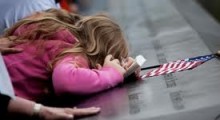Dr. Robert Gangi is a licensed clinical psychologist who works with individuals facing separation and loss. He has his own private practice, the Greenwich Village Center for Separation and Loss, in addition to working as a psychiatric crisis psychologist for the City of New York. He has worked with people who lost loved ones to the TWA flight 800 and Air France Concorde crashes as well as those who lost loved ones on September 11th.
 Kelly: Can you tell us a little bit about your job and what you do?
Kelly: Can you tell us a little bit about your job and what you do?
Dr. Gangi: Right now I’m mostly private practice with a specialty in grief, and I also work a couple days a week in a clinic on a college campus.
Before this, I used to work for the Psychiatric Mobile Crisis Team in New York City, and one of our jobs was to respond to disasters like the TWA crash and homicides.
I actually started getting the idea of doing grief work when we worked with people during 9/11.
Kelly: Where were you when you first heard the news about the 9/11 attacks?
Dr. Gangi: I was on my way to work and I actually saw the second plane hit the building. We waited because we knew it was only a matter of time before we were sent to help.
Kelly: Is the process of grieving different for those affected by losses from a national tragedy such as 9/11?
Dr. Gangi: I’m not sure if I’d distinguish it, but it [9/11] was a homicide, it was completely unexpected, it was surreal. It was so unique because it was public so it was shared. It’s such a unique experience because it stands on its own in so many ways.
It’s different for everyone, because every relationship is different. There were some things that everyone had in common, and there are some things that make every experience unique.
Kelly: About how long, on average, did you work with family members/friends/coworkers/etc. of those who died on 9/11?
Dr. Gangi: I’ve had very few people come to my private practice who lost people on 9/11. It was by definition short-term when I worked for the city. I remember we saw a little girl whose uncle worked in a restaurant at the top of the World Trade Center, and her teacher referred her, and her mother wasn’t English-speaking, and there were some programs that were bringing family members of the firefighters to get help, and they let her join. And it was over the course of a month, and then the best thing to do after that was to give them their privacy back.
Kelly: What advice do you have for SevenPonds readers who might be dealing with a loss?
Dr. Gangi: Be aware that grief can be a very alienating experience; that you are very often going to feel like an alien walking down the street. Many people can’t and don’t want to grasp what you’re in the middle of. One of the biggest challenges is not to doubt yourself and the validity of the pain you’re in. If at all possible, don’t hesitate until you find someone to speak to who gets it. It’s very easy to feel like you’re the crazy one, but you’re not.
Kelly: Thank you so much, Dr. Gangi!

 How to Deal with a Loss? An Interview with Dr. Robert Gangi
How to Deal with a Loss? An Interview with Dr. Robert Gangi


 “In Case You Don’t Live Forever” by Ben Platt
“In Case You Don’t Live Forever” by Ben Platt
 Our Monthly Tip: Make an “In Case of Death” File to Ease Loved One’s Grief
Our Monthly Tip: Make an “In Case of Death” File to Ease Loved One’s Grief
 Passing of Beloved Comedian Births a New Comedy Festival
Passing of Beloved Comedian Births a New Comedy Festival














